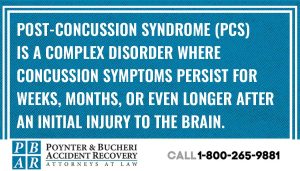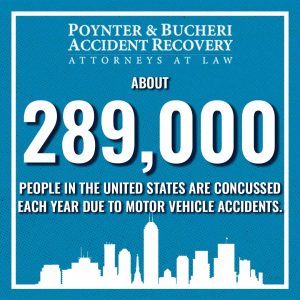
Understanding Post Concussion Syndrome After a Car Accident

According to the Centers for Disease Control and Prevention (CDC), about 289,000 people in the United States are concussed each year due to motor vehicle accidents. This is why we need to understand post concussion syndrome after a car accident.
If you or a loved one has been injured, it’s important to know you don’t have to recover from this car accident alone.
Poynter & Bucheri compassionate and experienced post-concussion syndrome attorneys are here to help you through every step of the process.
This article will help you understand how car accident-related post-concussion syndrome occurs and how you can seek compensation for this serious condition.
What Is Post-Concussion Syndrome?

Post-concussion syndrome (PCS) is a complex disorder where concussion symptoms persist for weeks, months, or even longer after an initial injury to the brain.
Post-concussion syndrome can develop following serious head trauma or a mild traumatic brain injury, which often occurs in motor vehicle accidents.
Post-concussion syndrome (PCS) and mild traumatic brain injuries (mTBI) are often caused by a violent blow or jolt to the head or body, which can occur in various situations, including car accidents, sports head injuries, falls, and physical assaults.
The sudden impact of a car accident can cause the brain to rapidly move back and forth inside the skull, leading to a concussion, bruising, bleeding, and disrupting normal brain function. This disruption can trigger a series of biochemical changes that result in the symptoms associated with PCS.
Individuals who have experienced previous concussions are more susceptible to developing PCS, as their brains may already be in a vulnerable state.
Immediate medical attention after any car crash or sports-related head injury is needed to properly diagnose and manage the condition.
Concussion Symptoms
Post-concussive syndrome manifests through a range of symptoms, including:
- Physical symptoms: Headaches, dizziness, fatigue, blurry vision, and balance problems.
- Cognitive symptoms: Memory loss, difficulty concentrating, post-traumatic stress disorder, and confusion.
- Emotional symptoms: Irritability, anxiety, depression, and mood swings.
Diagnosis of Post-Concussion Syndrome
Diagnosing PCS involves reviewing the patient’s medical history, performing a physical examination, and obtaining diagnostic imaging, such as a CT scan or MRI.
Your emergency or primary care physician may assess cognitive function through various tests to identify specific symptoms of PCS.
If you have ongoing difficulty concentrating after a car accident, follow up with your primary care doctor because when concussion symptoms persist, you may have a serious injury.
Contact Poynter and Bucheri Law Firm at 1-800-265-9881 for a free consultation of your concussion case.
Who Is at Risk for Post Traumatic Headaches?
Certain demographic factors such as age, gender, and a history of previous concussions can increase the risk of developing Post-concussive syndrome, with older adults, young children, and women being more susceptible.
Pre-existing conditions such as migraines, anxiety, depression, and other psychological disorders can increase the likelihood of developing PCS after a car accident and come with a higher chance of worsening symptoms over time.
Physical Impact from Concussion Symptoms
PCS can cause persistent physical symptoms, including multiple symptoms such as:
- Headaches: Often described as concussion headaches, they can be severe and debilitating.
- Dizziness and balance issues: These symptoms can affect daily activities and increase the risk of falls.
- Fatigue: Chronic fatigue can significantly reduce quality of life.
- Double vision and blurred vision: Visual disturbances that can interfere with daily activities.
- Sleep disturbances: Problems with sleeping patterns that can exacerbate other symptoms.
Cognitive Impact from Concussion Symptoms
The cognitive effects of PCS can include these other common symptoms too:
- Memory issues: Difficulty remembering recent events or learning new information.
- Concentration problems: Difficulty focusing on tasks, which can impact work or school performance.
- Confusion: Feeling disoriented or having trouble following conversations.
- Impact of mild TBI: Persistent cognitive challenges resulting from a mild traumatic brain injury.
- Previous concussion: A history of concussions can worsen cognitive symptoms in PCS.
Emotional and Psychological Impact from Concussion Symptoms
PCS can also have emotional and psychological consequences, experiencing other symptoms, such as:
- Anxiety and depression: These conditions can be exacerbated by the chronic nature of PCS symptoms.
- Mood swings: Unpredictable changes in mood can strain relationships with family and friends.
- Emotional distress: The ongoing struggle with PCS symptoms can lead to increased emotional stress.
- Experiencing symptoms: Individuals with Post Concussion Syndrome often experience a range of persistent symptoms that affect their daily lives.
- Lose consciousness: While not always present, losing consciousness during the initial injury can indicate a more severe concussion.
- Concussed brain: The overall impact on brain function due to the concussion and its aftermath.
Determining Fault for Post-Concussion Syndrome After Car Accident
Determining liability in car accidents that lead to PCS is crucial for pursuing a personal injury claim. Your attorney must prove who was responsible for the car accident and demonstrate their negligence.
This includes collecting evidence such as medical documents, accident reports, and witness statements to show that the at-fault driver caused your concussion injury.
Filing a Personal Injury Claim After a Traumatic Brain Injury or Concussion
Filing a personal injury claim for PCS involves several critical steps. Gathering comprehensive documentation, including medical records, auto accident reports, and witness statements is the first step.
Next, hire an experienced personal injury attorney to build your case and file the claim with the appropriate court or insurance company. If the settlement request is rejected, your case will likely go to court and your attorney will explain the steps needed to prove your case.
Poynter and Bucheri Law Firm knows how to stand up to a reluctant insurance company. Call 1-800-265-9881 for a free consultation on your concussion lawsuit.
Compensation and Settlements
Victims of PCS can seek compensation from the at-fault party’s insurance company for various damages, including:
Medical expenses: Costs for emergency room visits, hospital stays, surgeries, diagnostic tests (MRI, CT scans), physical therapy, occupational therapy, prescription medications, follow-up appointments, and future medical care.
Lost wages: Compensation for income lost during recovery and wages lost due to attending medical appointments.
Diminished earning capacity: Compensation for reduced ability to work in the future and impact on career progression.
Pain and suffering: Monetary compensation for physical head and neck pain, emotional distress (anxiety, depression), and loss of enjoyment of life.
Property damage: Reimbursement for vehicle repair or replacement and compensation for personal belongings damaged in the car crash
Rehabilitation and therapy costs: Expenses for long-term rehabilitation programs and specialized therapies.
Disability and disfigurement: Compensation for permanent disability and damages for disfigurement and scarring.
Travel expenses: Reimbursement for transportation to and from medical appointments and travel costs for specialized medical care.
Home and vehicle modifications: Costs for installing wheelchair ramps, bathroom modifications, and vehicle adaptations for accessibility.
Caregiver and assistance costs: Compensation for hiring in-home caregivers and expenses for personal assistance with daily activities.
Loss of consortium: Compensation for the impact on relationships with a spouse or partner and loss of companionship and support.
Legal fees and court costs: Coverage for attorney fees, court filing fees, and overall legal costs involved in pursuing the claim.
Loss of household services: Compensation for the inability to perform household tasks and costs of hiring help for household chores.
Punitive damages: Additional compensation to punish the at-fault party for particularly egregious behavior.
Out-of-Pocket Expenses: Reimbursement for over-the-counter medications, medical equipment (crutches, braces), and miscellaneous expenses related to injury recovery.
Contact Poynter and Bucheri Law Firm at 1-800-265-9881 for a free evaluation of your concussion lawsuit.
Treatment and Management
If you suspect a concussion after a car accident, it is crucial to seek immediate medical attention.
Emergency department doctors can provide initial treatment for post-concussion symptoms and evaluate the severity of the full closed head injury and neck injury themselves.
Long-term treatment for concussion syndrome may include:
- Medications: To manage concussion symptoms such as headaches and depression.
- Therapy: Physical therapy (PT) for balance issues and cognitive therapy for memory and concentration problems.
Making lifestyle adjustments after the initial accident can help manage PCS symptoms:
- Rest: Ensuring adequate rest and sleep.
- Activity modifications: Avoiding activities that can exacerbate symptoms.
Support from a family member, friends, and support groups can be invaluable in managing PCS. Joining support groups allows individuals to share experiences and coping strategies.
Contact Poynter and Bucheri Law Firm today at 1-800-265-9881 to see if you have grounds for a concussion lawsuit.
How Long Does It Take for Post-Concussion Syndrome to Go Away?

The duration of post-concussion syndrome (PCS) can vary significantly from person to person. While many individuals start to feel better within a few weeks to a few months, others may experience symptoms that persist for a year or more.
Several factors influence the recovery time, including the severity of the initial concussion, the individual’s overall health, and whether they have a prior concussion.
It’s crucial to follow a tailored treatment plan provided by healthcare professionals and to allow adequate time for the brain to heal.
Patience and proper medical care are essential, as rushing recovery can potentially exacerbate symptoms and prolong the healing process.
Need help with your concussion-related medical bills? Contact Poynter and Bucheri Law Firm at 1-800-265-9881 for a free concussion case evaluation.
Frequently Asked Questions (FAQs)
How long does it take to make a full recovery from PCS?
PCS duration varies. A mild traumatic brain injury can last from a few weeks to several months or longer. Permanent damage is also possible with a more severe injury.
Can PCS symptoms come and go?
Yes, symptoms can fluctuate in intensity and frequency. It’s important to follow your dr’s orders related to monitoring your symptoms and seeking follow up care.
Is PCS permanent?
While most people experience a full recovery, some may experience persistent symptoms requiring a complex treatment plan with ongoing medical treatment.
How to find a good lawyer for car crash concussion cases?
Seek a lawyer with experience in personal injury cases related to brain injuries. Look for a proven track record, strong negotiation skills, and empathy for your situation.
What if the accident was partially my fault?
Indiana follows a comparative fault rule, meaning you can still recover damages if you are less than 51% at fault. Your compensation will be reduced by your percentage of fault.
What should I do immediately after being diagnosed with PCS?
It’s crucial to follow your physical medicine provider’s advice, rest, and avoid activities that could worsen your symptoms. Document all symptoms, and medical records in case you need them to prove your legal case.
Can I return to work or school with a concussion?
This depends on the severity of your symptoms and the advice of your healthcare provider. Gradual return to work or school with accommodations may be necessary.
Can I file a PCS claim if symptoms appear long after the accident?
Yes, you can still file a claim if symptoms appear later, but it’s important to always seek medical care as soon as symptoms arise and document everything.
Contact Poynter & Bucheri for Help with Your Severe or Mild Traumatic Brain Injury Lawsuit
Understanding post concussion syndrome after a car accident is essential for victims seeking to manage their symptoms and pursue legal action.
If you or a loved one is experiencing PCS, know that you are not alone. There are medical treatments and legal options available to help you navigate this challenging time.
We encourage you to seek medical attention after a car accident and secure legal help if you suspect PCS.
Contact Poynter and Bucheri Law Firm at 1-800-265-9881 free concussion injury case consultation.
